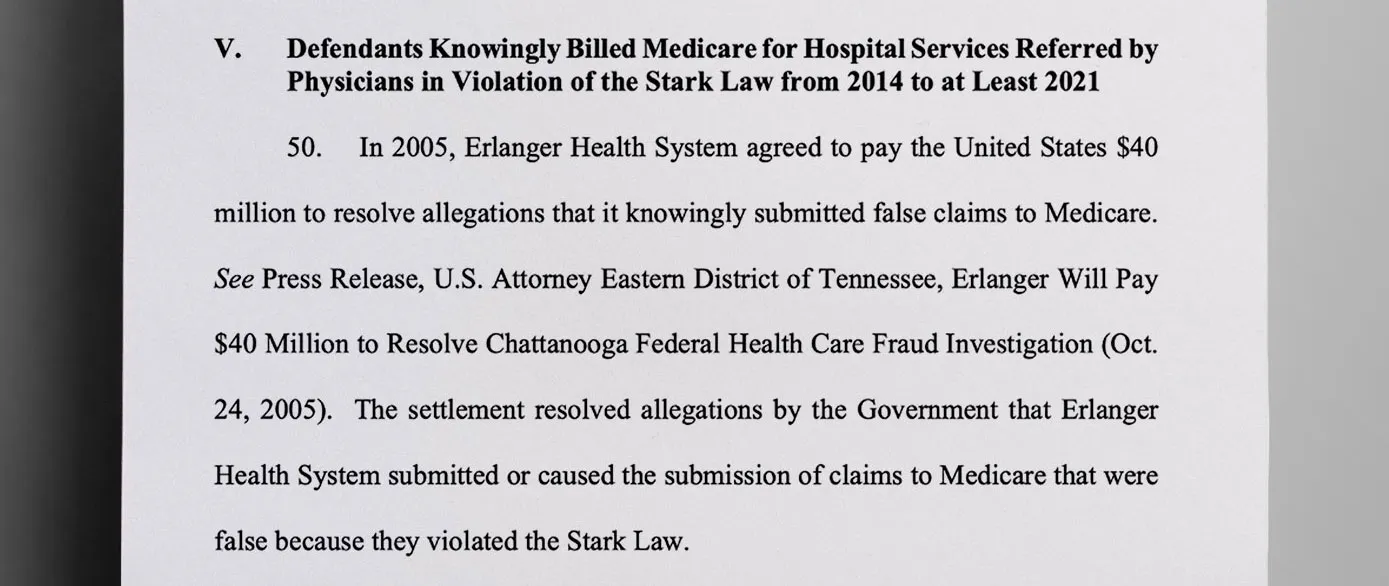U.S. Files Complaint Against Erlanger Health for False Medicare Claims, Improper Relationships with Physicians

Erlanger Hospital Baroness Campus is part of the Erlanger Health System, which is under fire for alleged Medicare fraud. © Erlangerhealth, CC BY-SA 4.0.
The complaint accuses Murphy Medical Center of violating the federal Stark Law, which prevents hospitals from billing Medicare for services referred by a physician who has a financial relationship with the hospital that doesn’t qualify for a statutory or regulatory exception. Murphy Medical owns Erlanger Western Carolina Hospital and Chattanooga-Hamilton County Hospital Authority. The defendant is referred to as “Erlanger” throughout the official documents.
Specifically, the U.S. Attorney’s Office alleges Erlanger employed several physicians who did not meet Stark Law exceptions “because the compensation Erlanger paid to the physicians was well above fair market value,” a press release from the Department of Justice’s Office of Public Affairs noted.
The Justice Department contends Erlanger received referrals from physicians “in violation of the Stark Law and submitted claims to Medicare knowing that the claims for those referred services were not eligible for payment” from 2014 to 2021, the press release states.
Specific Allegations
This is not the first time Erlanger has allegedly run afoul of the DOJ due to inappropriate Medicare claims. The healthcare provider settled a 2005 case for $40 million. It was under a “corporate integrity agreement” with the Department of Health & Human Service’s Office of Inspector General from 2005 to 2010.

“Beginning in 2013, Erlanger Health System implemented a strategy to increase profits by employing more physicians, particularly specialists who practiced at competing hospitals whose patients would require revenue-generating hospital stays,” the DOJ complaint states. “Once hired, Erlanger expected its physicians to treat their patients at Erlanger’s hospitals and refer them to other providers employed by Erlanger, thus generating downstream revenue for Erlanger.
“To facilitate the hiring and retention of physicians who would generate significant downstream revenue, Erlanger relaxed or eliminated the oversight and controls on physician compensation that had been in place under the CIA,”
the complaint says.
The DOJ contends that Erlanger physicians were told “to refer their patients to Erlanger specialists and to keep their patients within the Erlanger Health System or they would be replaced by physicians who did.”
Erlanger’s actions resulted in its physicians with profitable referrals being among the most highly compensated in the nation in their specialties, the DOJ said.
About the Stark Law
The Stark Law was enacted to ensure financial self-interest would not affect a physician’s medical decision-making on whether health care services were necessary, which services were
preferable, and who should provide them to his or her patients. The statute is intended to prevent a patient from being referred for health services that are unnecessary, more expensive, lower quality, or less convenient solely because the physician may be financially compensated by those referrals.
Under this law, a hospital cannot submit claims to Medicare for health services that are referred to it by a physician with whom the hospital has a “financial relationship” not exempted by the statute. These designated health services include inpatient and outpatient hospital services.
The Stark Act defines a “referral” as a physician’s request for a designated health service. Services performed by the physician are not considered “referrals.” However, there are other fees and charges related to health services besides the physician’s performed services.
A key element in the Stark Act focuses on the concept of “fair market value” for health care services. This concept plays a large part in determining whether a physician’s arrangement with a hospital is exempt from the statute. A major exemption is the physician’s employment agreement with the hospital.
The main areas of concern when enforcing the Stark Law is to prevent a physician from referring patients to a hospital when there is a financial relationship between the physician and hospital, or between the hospital and an immediate family member of the physician, according to the NIH’s Stark Law reference page. These relationships can be an investment interest in the hospital.
As the DOJ notes in its official complaint against Erlanger, “Compensation for personal services above the fair market value of those services can suggest that the compensation is really for referrals.”
The complaint also cites a 2019 3rd Circuit Court ruling that noted, “Anyone would wonder why the hospital would pay so much if it were not taking into account the doctor’s referrals for other services.”
If a physician is a bona fide employee of the hospital, they must be hired for identifiable services, and the remuneration amount must be consistent with the fair market value of the services. Payment to the physician cannot consider, directly or indirectly, the volume or value of referrals from the physician.
Threatens the Integrity of Medical Decisions
“Improper financial relationships between hospitals and physicians threaten the integrity of clinical decision-making and can influence the type and amount of health care that is provided to patients,”
Principal Deputy Assistant Attorney General Brian M. Boynton said in the U.S. Attorney’s press release.
Boynton, who leads DOJ’s Civil Division, said his department “is committed to ensuring that physicians’ treatment decisions are based on the needs of their patients and not their own financial interests.”
U.S. Attorney Dena J. King, of the Western District of North Carolina, said the government alleges Erlanger “compromised Stark Law compliance to boost its financial standing, knowingly overpaying physicians whose practices generated profits for the hospital.”
Four Causes of Action
The DOJ presents four principal claims in its complaint against Erlanger.
The first two relate to violations of the False Claims Act. The government is seeking triple damages and civil penalties. The DOJ alleges Erlanger “presented materially false or fraudulent claims for payment or approval to the United States, including claims to the Medicare Program for reimbursement of designated health services rendered to patients” who were referred to Erlanger’s employed physicians, which violates the Stark Law.
DOJ further contends that Erlanger presented the claims “with actual knowledge of their falsity, or with reckless disregard or deliberate ignorance of whether or not they were false. This included knowingly using false records.
The third count is for “unjust enrichment,” based on the government’s position that Erlanger received payments it was not entitled to. The DOJ asks the court to determine that amount and require the defendant to repay it.
The fourth count asserts the government is owed any payments it made “under the mistaken belief that defendants were entitled to receive payment for such claims, which were not eligible for payment.” The government seeks reimbursement of all such payments made in error.
In addition to those claims, the DOJ asks the court to require Erlanger to pay all “pre-and post-judgment interest, costs, and such other relief as the court may deem appropriate.”
More From This Author
Cries of the Missing: The Tragedy of Missing/Murdered Indigenous People– ‘None of Us Are Safe Until All of Us Are Safe’
Feature Raymond L. Daye | Dec 11, 2024

Elder Fraud Skyrocketing in Post-Pandemic America
Resource Raymond L. Daye | Dec 2, 2024

Weekly Muck
Join the mission and subscribe to our newsletter. In exchange, we promise to fight for justice.
Weekly
Muck
Join the mission and subscribe to our newsletter. In exchange, we promise to fight for justice.





